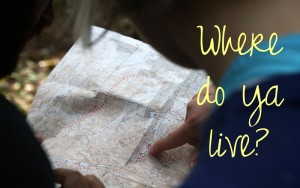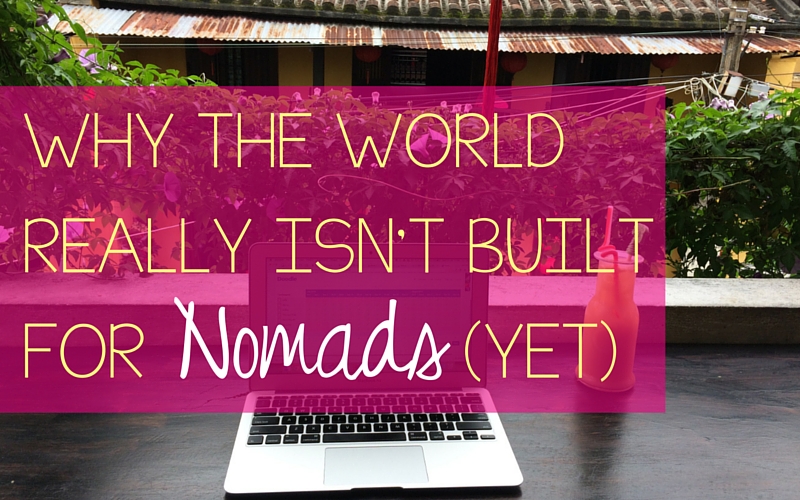I’ve just been going through the Digital Nomad Girls Facebook group that I founded, and came across a post by Anna, who’s been in the group for a good while now. She asked a question about health care for herself (a US citizen) and her husband (a UK citizen) and shared how confusing it is to figure out these things when you’re nomadic. She ended her post saying “the world isn’t really built for nomads”. And I couldn’t agree more.
Digital Nomad Bureaucracy
Now, without wanting to sound too sad for myself, over the last few months I have really been struggling. Why, you ask? (or not, but I’ll tell you anyway) Ever since returning home to Munich I’ve been trying very hard to do all the right things. And with right things I don’t mean eating as many pretzels and drinking as much beer as possible, rather, I mean the adult stuff. Like sorting out your bank accounts, taking care of health insurance (like Anna), student loans and taxes. Yes, taxes.
It might be useful to explain at this point that I’ve only been a digital nomad for just over half a year, so there’s still A LOT to figure out. But I have been travelling for the last 2.5 years, so some of this stuff should be getting easier by now.
Instead, it is actually getting harder. The world really isn’t built for nomads yet.
Let me explain why. Obviously this is different for every digital nomad, but these are things I have seen and heard discussed more times than the ever popular Thailand Visa discussion, there is definitely confusion out there. So in case anyone else is struggling, like me, (and maybe has dual German/British citizenship like me) and is confused, like me, here we go.

Permanent Address?? Hell no.
Whenever you want to take care of anything to do with bureaucracy, the first thing people ask after your name and date of birth, is your permanent address. Most people wouldn’t be too phased by this, but as a digital nomad chances are pretty high that you don’t have such a thing. I certainly don’t. When I’m in Munich I stay at my parents’, in the UK at Simon’s parents or my friends house, and abroad I change address like other people chewing gums. Last week, I was even told that I am technically homeless, yes homeless, by a lovely man from the tax office. So that is the first reason why the world isn’t really built for nomads yet: permanent addresses.
There’s usually a way around this: register at your parents’ or friend’s house, or even with a coworking space, some of them offer an address for a fee. It becomes more than a nuisance however, if it impacts the way you get taxed or how much you have to pay for health insurance. Which brings us to the next point.

The Digital Nomad Health Insurance Conundrum
When I am abroad I have travel insurance, so in case I break my leg snowboarding (fat chance, I hate snow) in, let’s say, New Zealand (they have snow right?), then I would be taken care of in a hospital. And if it’s really bad, I’d be sent home to my family. So far, so good.
Whenever I return home to Germany I have to get health insurance, however. This isn’t too hard if you’re a travelling bum: you just get something called voluntary insurance. Ok, it’s €170 a month, but at least you can go to as many doctors as you want, get your check-ups, pap smears and everything your little hypochondriac’s heart desires.
Once you are a self-employed (and we’ll get to that in a bit) digital nomad, this all changes. Now you have to get self-employed insurance, which would also not be that bad if you didn’t have to pay for it all year round, even when you’re not in the country (and are already paying extra for travel insurance). It doesn’t come cheap either. €254 a month is the minimum payment, even if you only make €50 a month! So, obviously, when you’re starting out this sucks. Big time. Which brings us to the second reason why the world isn’t really built for nomads (yet): health insurance.
There simply isn’t a perfect solution (as a German/British mongrel) to be able to use travel insurance while abroad, and affordable insurance while at home. There are some ways to get around it, but I had to almost harass the poor insurance lady on the phone to admit this to me. You can kind of freeze your insurance at home while you’re abroad, by paying around €52 per month for something called Anwartschaft (one of those funny German names that not even Germans know what it means). Then, when you return home you unfreeze it and start paying €250 (minimum) while you’re here. There are also other options, but as far as I can see this is the best one if you want to be able to do check-ups etc, and not just be entitled to emergency care.
Now that we’ve discussed insurance, let’s move on to the even more popular topic: taxes.

The Digital Nomad Tax Confusion
At some point or other most digital nomads start thinking about where and how they should best pay taxes. I know that a lot of people think we live this life to avoid paying taxes, but from my experience, this really isn’t the case. Most of us want to do the right thing. Make a nice living online while travelling the world, and pay taxes somewhere, hopefully their home country, instead of having to deal with this in every country you arrive. Sounds easy. But it isn’t. Especially if you have dual citizenship. And clients on 3 different continents. And everyone needs a different type of invoice (including VAT, excluding VAT, double VAT with a side of fries??). And you have no clue what you’re doing. Or where your permanent address is.
So you see, taxes are one of the biggest confusions for digital nomads, especially when starting out, and reason number 3 why the world really isn’t built for nomads (yet).
So far, I’ve only figured out that for me, it’ll be easier to set up shop in the UK, at least for now. They make the process MUCH easier than Germany. After about 25 calls to 25 different German offices, I was told that there was nobody who I could turn to for advice, because (and I quote) “we expect people who want to register as self-employed to be intelligent enough to figure it out themselves, after all, they’re doctors or lawyers”. BOOM!
After I politely told the gentleman on the phone that I had a PhD in chemistry, yet still understood nothing (NOTHING), he told me he was sure I’d figure it out then. Great. So off to the UK I go, where nobody expects me to be intelligent enough.

Money makes the world go round?
But not before struggling with another popular Digital Nomad pet peeve: banking. Now that’s a classic. How do I get paid abroad? How can I withdraw money without being bankrupted every time? Why is Paypal so confusing? All of these are pretty good questions, and again, there’s no perfect solution. I know US citizens can get the Charles Schwab credit card, which is close to perfect. And in Germany I can get the DKB debit card for free international withdrawals. But as with all things bureaucratic: you gotta have your permanent address first, and then you can apply for banking. As for getting paid, there are a few options out there: Paypal, Payoneer, Transferwise. All of these options will take a fee, and some of them even freeze your funds once in a while, for a laugh (*cough paypal *cough).
All this makes banking the 4th reason why the world isn’t really built for nomads (yet).

Sallie Mae doesn’t like nomads, either
Talking about finances, we also have to mention something that US & UK citizens are usually more familiar with than us spoilt, freely educated Germans: student loans.
Aaah, another one of my all-time-faves. This is something I have seen on many forums and groups as well. How do you deal with your student loans while you’re abroad/starting out as a digital nomad/when travelling long term? I can only say, I have no idea. It really depends on where you’re from, where you went to school and what terms your loan includes. Some countries make you pay back only once you hit a certain income threshold. Others make you pay even if you have no income. Or it depends on the country you’re living in, because they take living costs into account. And so on. In Germany, you have to pay after 2 years, even if you’re making a pittance. Lucky me. This confusing system makes student loans the 5th reason why the world isn’t really built for nomads (yet).
So there you go. I know I might raise an eyebrow with all this whinging and whining. There is something good that could come from this, though. None of the approximate 846 civil servants, insurance consultants and bankers I recently had the pleasure to talk to (and to be very honest most of them were super nice) knew what a digital nomad was.
Now they do.
So by asking, inquiring, trying to do the right thing, we are putting digital nomads on the bureaucratic scene. Sooner or later someone at an insurance company, bank or office will start listening and will come up with the perfect solutions for us. It’s just a matter of time until the world gets rebuilt for nomads.
What about you? Have you had to deal with any of these boring issues? Please share in the comments!




 Hi, my name is Jenny. I'm a scientist, turned world traveller, aspiring digital nomad and noodle soup enthusiast. This is my blog where I share my journey to a location independent lifestyle. Join me!
Hi, my name is Jenny. I'm a scientist, turned world traveller, aspiring digital nomad and noodle soup enthusiast. This is my blog where I share my journey to a location independent lifestyle. Join me!
This was a great post, and is basically what my nightmares each night consist of as an American living in Berlin who also plans to get back to long-term traveling once I get my permanent residence here. Even just figuring out the German/American systems is enough stress without adding in the traveling! I’ve already been wondering what will happen with my TK health insurance if I switch to traveling, so thanks x 100 for the tip about Anwartschaft! I’m sure I would have had to cry on the phone to about 100 German customer service representatives to find that out myself!
Hi Nicole!
I’m so glad that my
rantpost could help a bit! It’s such a tricky system to figure out, I wish there was someone who could explain it all in normal-people-language. Let me know how the Anwartschaft goes! I’m probably going to try it next time I leave Germany too.I got you girl!
I grew up in Austria, lived in Amsterdam for the past 2 years. And I’ve been traveling since end of December. I’m paying health insurance in the Netherlands, but actually I don’t live at the place I’m registered to.
On the other side I can deregister, because my bank account is also in the Netherlands.
Eventually I’m also registered in Austria, because when I left I thought I would come back soonish. And at least my Dad is there to handle bureaucracy for me.. well, not so legal I guess.. but it’s sooo hard to figure out.
Now I want to register my freelance business too – but where?!
Don’t get me wrong! I want to make it right. It just seems like the world doesn’t let us.
I guess there are options. The thing is, in the beginning you don’t make a lot of money and can’t really afford all those high prices like for example extra insurance, fees for coworkings spaces as home addresses (little things), etc.
We should stand up for our rights and push the companies to create products for us! I mean, it’s time for it and they gain from it too.. money! And isn’t that what they are looking for?
I can SO relate to everything you wrote! I am really trying to do the right thing, play by the rules, but it seems nobody actually has a rule book. I guess we just figuring it out step by step and hope we don’t get screwed over. OR we make noise and change the system! It’s got to happen anyway 🙂 Let’s do it!!
I just spent lots of days figuring out laws of different countries. My ‘home’ country with permanent address, which as you say might not be the best thing to cancel, but it also brings other issue that brought me here and is making me struggle and feel pain and hell of reading law documents is Health Insurance… – mandatory by law in EU, luckily it’s not that ourageous as in Germany if I declare to be voluntarily unemployed.
And then there is UK where I might want to have my or at least part of my self-employment registered, and maybe even deal wth the EU-requirement Health care problem that way. But from the law (It is ver ambiguous as it even says ‘THere is no legal definition of a resident’ << Great, there are basically guidelines guiding you to decide based on the feelings of whoever might care if you are a resident … Even better :D)
So now I am just getting annoyed and your article came up and I just had to read it.
Plus there was a Hippie in the name so I had to check it out :).
Now I'll have a quick look around your website.
Good luck to you and everyone suffering 😀
Hi Jenny,
I am a dutchie, no where registered, still with dutch bankaccount, and expat health insurance (which also covers when I am in the netherlands). I have a Wyoming LLC which let’s me use my Dutch bankaccount for my business. I pay taxes wherever I am registered…. whenever asked, I use my dad’s address (as a post address). .
In 2012 I emigrated to Indonesia, when leaving about a year ago I did not know where I wanted to settle so I decided to not register anywhere until I decided what would be the best place for me. I still haven’t found that out but it seems like I rolled into a pretty good situation for a nomad. At least, I’m happy with it :).
Thanks for sharing this post! Nice to get these insights!
I’m British and registered as self-employed in Germany. Just get an accountant to help and explain how to do the necessary regular stuff (e.g. Umsatzsteuervoranmeldung).